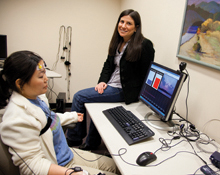People
March 15, 2010
Profile: Wii-toting psychologist busts stress

Dana Wyner
As the calm and collected overseer of Eagles at Ease Stress Management Services, Dana Wyner ’04PhD encourages her clients to take a mental mini holiday, go limp like JELL-O and feel snug as a bug in a rug.
Those practical lessons for relaxation on the go are particularly helpful during exam time, when nerves are frayed and performance anxieties go into overdrive.
The Student Counseling Center Stress Clinic, funded by Emory’s new mental health fee, sees more than 30 students each semester for issues such as test-taking anxiety, phobias, insomnia, difficulty concentrating, headaches and hypertension. Services include helping students develop a personalized toolbox of positive coping strategies, small group training in relaxation skills and biofeedback, and individualized therapy sessions.
Wyner and her staff of seven mental health providers, which include social workers and upper-level trainees, teach participants deep controlled breathing, progressive muscle relaxation and self-directed kindness and compassion. Students can enroll in biofeedback training, where they are hooked up to a computer to evaluate their physiological responses to stress. The equipment measures sweat, heart rate, respiration rate, muscle tension and fingertip temperature – typical “fight or flight” signs of a body under extreme stress.
“Biofeedback gives students a sense of personal control,” says Wyner, staff psychologist and stress management and biofeedback coordinator. “They learn that they have the tools to regulate anxiety.”
Since Wyner joined Emory in 2008, the clinic has expanded from a short-term intervention program to a 10-week curriculum with measurable outcomes. Students identify specific goals, such as building self-confidence, initiating social interactions, and managing test-taking anxiety, and rate their progress along the way. To achieve maximum benefits, participants are asked to supplement their weekly in-class training with at-home practice for 10 to 15 minutes a day.
Wyner became interested in stress management as an Emory doctoral student in clinical psychology, specializing in mood and performance enhancement issues among student athletes. She is also an enthusiastic athlete and sports fan, having played the position of goalkeeper as an undergraduate on the Tufts University women’s soccer team. She now enjoys hiking, snowboarding and pilates.
“Athletes are such a tight-knit group,” she says. “There is still a lot of shame and stigma associated with getting help.”
After taking a brief hiatus from psychology to explore life as a market research consultant in New York, Wyner returned to the field when she found what appeared to be a tailor-made job description posted at Emory, under her former graduate supervisor, Counseling Center Director Mark McLeod.
“It’s as if I have come full circle,” she says.
While athletes represent a minority of Stress Clinic clients, Wyner is working with Emory coaches, sports medicine staff and athletic directors to incorporate stress management as a means to helping the body realize its optimum potential. At outreach events across campus, she totes along her biofeedback system and Wii Fit to “illustrate the mind-body connection in a concrete way.”
The clinic is in the process of surveying students to evaluate existing services and to determine effective future directions for the stress management program. Wyner and her team plan to publish the results so that Emory may serve as a model for other universities. Initial findings are promising, Wyner says, with some participants reporting less reliance on anti-anxiety medications and decreases in harmful behaviors, such as forms of self-injury.
“Students are using positive self-talk to face the challenges in their lives,” Wyner says. “I have seen students with anxiety concerns go from being highly symptomatic to having virtually no symptoms at all. I’m just really happy with how the clinic is coming along. We have a team of really outstanding clinicians and that is an invaluable asset to the clinic’s growth.”
Quick Links
File Options
Related Information
Do you know a student who is exhibiting signs of extreme stress? The Student Counseling Center offers a guide for faculty and staff to make referrals.
